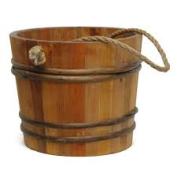The Sunday readings from Ezekiel well as from Mark’s Gospel both have agricultural references to growth. At the heart of both of them is the statement that growth cannot be rushed. So let’s look at three points underscoring this idea.
Thimbles vs. buckets,
Implied in the parable that Jesus tells is that different types of seeds can be sown (wheat vs. barley for example). These different seeds represent different capacities and capabilities. Different people have different capacities and therefore they have different capabilities as well. This means that God made different people to have different purpose s in life. A 50 gallon drum and a 16 ounce water bottle have different capacities. Just because the drum holds more doesn’t mean it’s better or more valuable. What are you using when you go for a run or a workout? What do you need when a hurricane is coming and you might lose water pressure for a few days? “This is the way in which God’s kingdom can change size” depending on what God is accomplishing in the world. (From “Glancing Thoughts” by Eleanor Stump).
s in life. A 50 gallon drum and a 16 ounce water bottle have different capacities. Just because the drum holds more doesn’t mean it’s better or more valuable. What are you using when you go for a run or a workout? What do you need when a hurricane is coming and you might lose water pressure for a few days? “This is the way in which God’s kingdom can change size” depending on what God is accomplishing in the world. (From “Glancing Thoughts” by Eleanor Stump).
The Proper Pace of a Person’s Life
There is an aspect of ministry that new priests - and new pastors - eventually learn, that is surprising and frustrating - and that is how LONG it takes to get things done. This is the case even when you are fully aware that progress is indeed being made and talented people are on board and cooperation is there and ample resources are present.
Why?
Is it possible that there is an inherent pace in the DNA of life? “Life is slow and subtle.” Thus you can’t force things forward.
God Gives It Growth - But People Play A Part.
We all have gifts. We each have a destiny. We can facilitate the Kingdom; we can also block it or hold it back.
This can be individually and this can  be institutionally as well. In his Book, From Good To Great, consultant and author Jim Collins writes about “getting the right people on the bus”. Leaders who don’t have the right types of seed in the garden will not see their organization or parish grow and thrive and be able to “feed” others. In addition, people need to accept the responsibilities given to them by God, exercise their capacity and capability and use their gifts and talents for others. How does one get it right? As Pope Francis said during his homily for the Feast of Pentecost:
be institutionally as well. In his Book, From Good To Great, consultant and author Jim Collins writes about “getting the right people on the bus”. Leaders who don’t have the right types of seed in the garden will not see their organization or parish grow and thrive and be able to “feed” others. In addition, people need to accept the responsibilities given to them by God, exercise their capacity and capability and use their gifts and talents for others. How does one get it right? As Pope Francis said during his homily for the Feast of Pentecost:
The gift of the Spirit on the evening of the Resurrection took place once again on the day of Pentecost, intensified this time by extraordinary outward signs. The word of God, especially in the readings from Pentecost, tells us that the Spirit is at work in individuals and communities filled with Himself. And what does the Holy Spirit do with this new capability which he gives us? He guides, he renews and he makes fruitful. (He guides us into all the truth (cf. John 16:13), he renews the face of the earth (Psalm 103:30), and he gives us his fruits (cf. Galatians 5:22-23).
Final thought: is this, perhaps, why God issued a “Commandment” about the Sabbath? 6 Days of work and then A Day of Rest. Fruitfulness does not merely depend on capacity - capabilities - talents. Timing is a key component for a successful harvest.
Audio version of homily is here:

